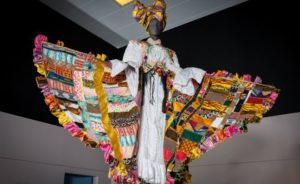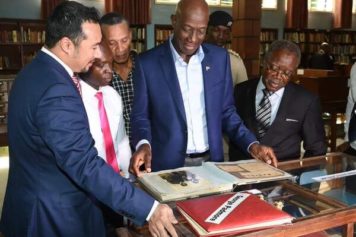With the days growing shorter, the British Library hopes to offer the perfect artistic antidote to a chilly London autumn: a tour of a huge chunk of African culture.
Word, Symbol, Song sets out to appeal both to Britain’s African diaspora and to people who have never visited any of the 17 nations involved.
There is no universally accepted definition of West Africa so, for the record, the exhibition covers Mauritania, Mali, Niger, Senegal, Guinea Bissau, Guinea, Burkina Faso, Togo, Benin, Cote d’Ivoire, Nigeria, Ghana, Cameroon, Sierra Leone, Liberia, the Gambia and Cape Verde.
It’s quite a list, but curator Marion Wallace says diversity has been a strength, not a problem.
“West Africa is a dynamic and hugely creative place.
“We wanted to give a sense of what has happened in writing, in visual art and in music, right up to the present day. But by some reckonings there are, for instance, a thousand languages in West Africa – so we can only pick out the main strands.
“West Africa has a very old tradition of both storytelling and scholarship. All this was going on from at least the eleventh century.
“The oral tradition of telling folk tales is another major part of the exhibition. In West Africa, one of the best-known tales is the Sundiata epic from the Mali empire, but we also feature less familiar stories.”
Yet the British Library has not created a dry display of dusty, ethnographic curiosities and folk literature. The display is helped hugely by the long tradition in West Africa of music, from the most ancient to the era of rap.
Janet Topp Fargion selected the musical content.
“We consulted widely, and the modern name which came up more than any other was the Nigerian superstar Fela Kuti – so we’ve given his material its own little room.
“Fela protested vehemently about the Nigerian government of the time and we wanted visitors to see how political his material can be.
“But his messages were carried in irresistible Afro-beat which he developed and which had a real flavour of jazz. As so often, it’s a story of genres mixing and influencing one another.
“Fela Kuti often sang in pidgin English because that way his message could get to other West African nations, and travel even beyond that.
“But if politics isn’t your thing, just enjoying the album covers is great fun.”
Fela Kuti died in 1997 and Topp Fargion was keen to include more recent material too.
Read more at bbc.com



